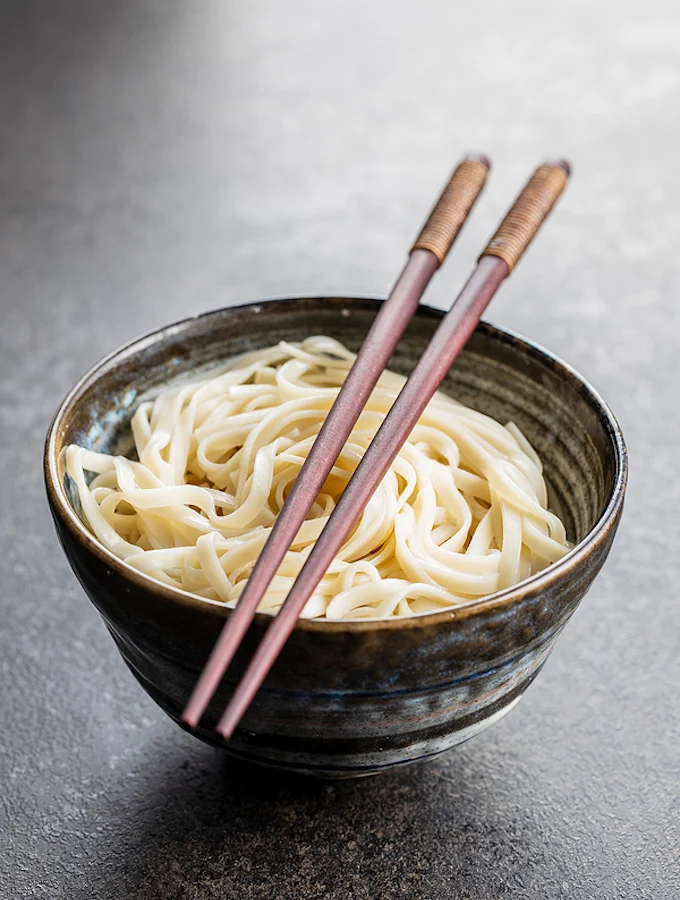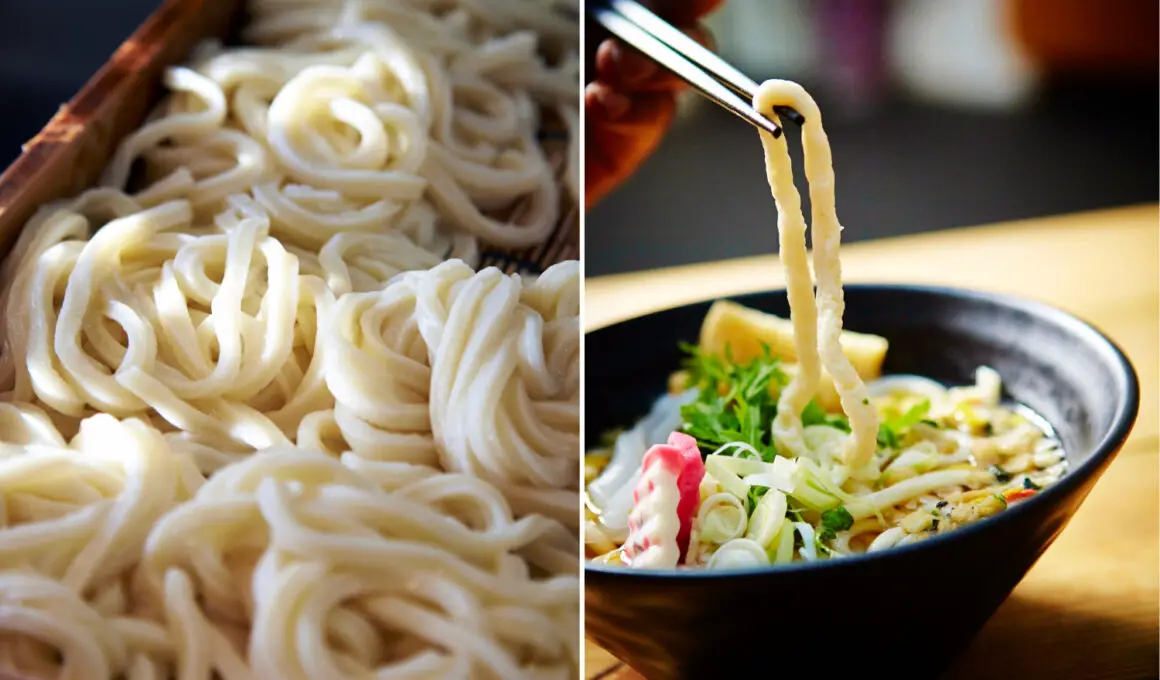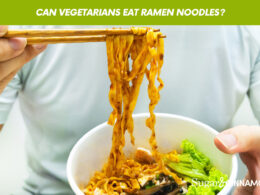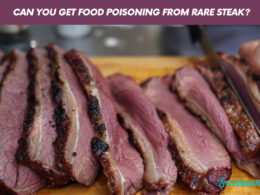Table of Contents Show
Noodles are not exactly on our top list of healthy foods however, it is believed that the good noodle and portions mixed with a fair amount of protein might not be so bad after all. There are so many stories explaining the origin of udon noodles, but one that stands out is the oldest one that claims that udon noodles came from China in the 700s.
Udon is a chewy Japanese noodle made from water, wheat flour, and salt, and they are typically thicker than buckwheat soba noodles, they can be either flat or rounded. There are so many ways udon noodles can be enjoyed, and based on how it’s made, it’s not precisely a high-calorie food. But this does not mean it’s healthy.
Udon noodles are surprisingly healthy and even serve as a balanced diet the right potion is served paired with a fair amount of protein. Udon noodles are made with these three ingredients, wheat flour, water, and salt. This makes it high in carbs and low in fat, vitamins, and minerals.
Udon might be recognized as a Japanese dish, but it is enjoyed worldwide. It’s a comfort dish worth having on a cold winter night. The fear of this dish being healthy has stopped many from enjoying it.
Is udon noodles healthy? Are udon noodles bad for you? If you are looking for a new comfort dish, udon fits that role perfectly with its amazing recipes. However, check out how healthy udon is in this blog post.
Udon Noodles Nutrition
Udon noodles are the oldest types of Japanese noodles and are the thickest. Traditionally, this noodle can be enjoyed hot or cold, which is why it’s many people’s favorite. Udon noodles are made by kneading wheat flour, salt, and water, kneaded and are shaped like noodles.
It can be enjoyed with varieties of toppings, sauces, and meats. You can have this dish paired with any of your favorite proteins.
Plain udon noodles consist of just wheat flour, salt, and water which may not exactly be bad for your diet plant unless consumed too often. Udon noodles do not exactly have a high nutritional profile and you have to be careful when buying one, ensure to check the label for the nutritional facts.
One cup of udon noodles contains 274 calories, 53 grams of carbohydrates, 10 grams of protein, and 213 milligrams of sodium. Udo noodles’ nutrition is primarily composed of carbs. Keeping in mind that nutritional content may vary depending on the brand and type of udon noodles, here’s nutritional content data of udon noodles based on a 100-gram serving size:
| Nutrient | Amount |
|---|---|
| Calories | 138 kcal |
| Protein | 3.3 g |
| Fat | 0.4 g |
| Carbohydrates | 28.3 g |
| Fiber | 1.2 g |
| Sugars | 0.4 g |
| Sodium | 22 mg |
| Potassium | 39 mg |
| Calcium | 8 mg |
| Iron | 0.6 mg |
| Magnesium | 7 mg |
| Phosphorus | 25 mg |
| Vitamin B1 (Thiamine) | 0.05 mg |
| Vitamin B2 (Riboflavin) | 0.01 mg |
| Niacin (Vitamin B3) | 0.6 mg |
| Folate (Vitamin B9) | 5 mcg |
Many think cooking udon noodles without the packet will make them healthier, but this is not the case, and this is because plain noodles are already high in sodium, the packet only contributes a little of that.
Are Udon Noodles Healthy?

As stated in the nutritional profile above, udon noodles are not that healthy, and they are only okay to be enjoyed if it is mixed with proteins and not in large quantity either. Nutritionally speaking, udon noodles are not exactly unhealthy as they are not high-calorie food, and they contain a significant amount of protein and carbohydrates.
Udon noodles are also high in fiber, producing a fair amount of nutrients. Also, they are a good source of the vitamin B complex (B1, B2, B3, B9). There is a chance to make udon noodles very healthy and that is by choosing whole wheat udon noodles and also mixing them with vegetables and lean proteins.
The wheat quality used in making udon will also determine how healthy it is. Note that without adding a fair amount of protein, udon noodles are mostly carbs with tiny amounts of fats and protein. It is pretty high in fiber though and is digested more slowly than simple carbs.
There is no reason not to enjoy a bowl of udon noodles occasionally. The whole-grain udon noodles should provide you with essential nutrients like niacin, potassium, phosphorus, riboflavin, zinc, folate, magnesium, and copper. So, while you won’t get much protein, you will get other essential nutrients.
Are Udon Noodles Healthier Than Ramen?
Yes, udon noodles are healthier compared to ramen. Kansui which is an alkaline used to give ramen its unique flavor is not used in making udon which makes it have lower sodium and also has a cleaner simpler topping.
However, both dish brim with flavor, and there are so many ways they can both be enjoyed.
You can make an excellent balanced dish with either udon noodles or ramen. Udon noodles made from wheat flour are very low in fat and cholesterol although they are not that high in nutrients like calcium, vitamin C, or vitamin A, they are quite healthier than ramen.
Wrapping Up
One of the surprising health benefits of udon noodles is that it contains non-animal protein which is very good for body growth, helps repair tissue, and for optional functioning.
You have to be careful when getting any type of noodles, ensure to check the nutrient label, many are high in sodium, but overall whole wheat udon noodles provide a decent amount of nutrients.
You do not have to stick to the regular method of making noodles when you are preparing udon noodles. Incorporate this yummy gluten-free noodle in soups or stews, top it with scallions, tempura, or fried tofu, and to make it a classy flavorful dish, combine it with shrimp, chicken, and cabbage.













